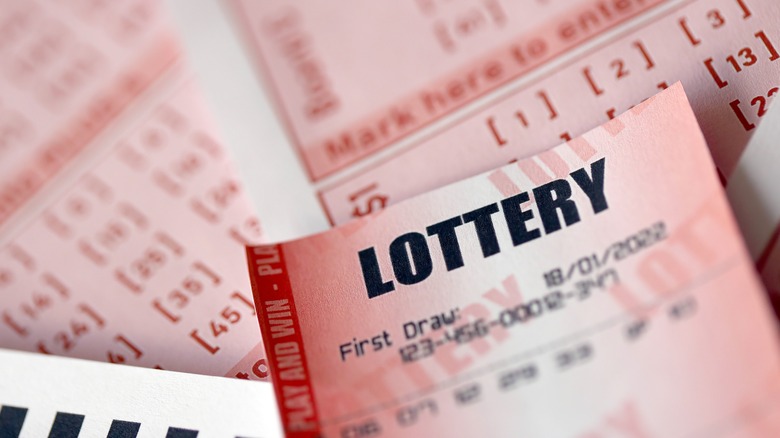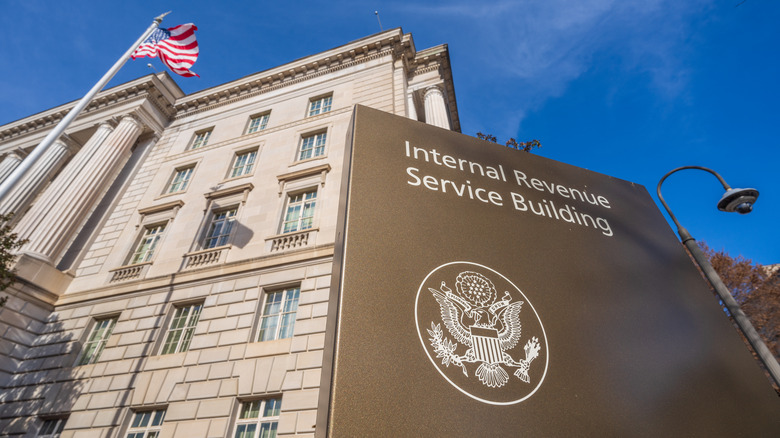People Who Won The Lottery And Still Ended Up Dead Broke
Do you dream about winning the lottery? You're not alone. Americans most likely to play the lottery are 45 to 54 years old, followed by those 55 to 64-year-olds and 35 to 44-year-olds. While the odds of winning for any of those age groups are abysmal, the earnings for a state with a lottery system are quite lucrative. State lottery sales in the U.S. totaled $107.92 billion in 2022. A lottery win of $5,000 or more automatically incurs a 25% tax on your winnings, with another 14.6% for seven-figure and higher winnings of 39.6%, the federal tax rate for the top income earners in the country. That doesn't even include state income tax, which you will be on the hook for come April.
The truth is, the odds of winning a major pot in the Powerball are about one in 292.2 million, while the Mega Millions draw offers you even worse odds of a one in 302.6 million chance of winning. This isn't the easiest way to become a millionaire, but hey, if luck goes your way, it can change your life. However, the following stories of people who won the lottery but ended up dead broke should demonstrate why you should bring that money to a financial advisor.
Lisa Arcand: $1 million
When Lisa Arcand won $1 million in the Massachusetts state lottery in 2004, she was a single mother with a dream of launching her own seafood restaurant. She celebrated with 20 of her closest friends and family members by uncorking a few $200 bottles of wine. According to The U.S. Sun, this was just the tip of the iceberg. After sending her son off to a $ 10,000-per-year private school, she took several vacations, purchased a furnished home, and avoided a $35,000-per-year maximum payment schedule by offering a financial services company $15,000 of her winnings per year for a $200,000 upfront advance. The services provided by this company are dubious at best since this arrangement immediately placed Arcand in a higher income bracket, skimming more in taxes from her winnings than necessary.
Then Lisa Arcand launched her restaurant Fisherman's Corner. While 67% of restaurant earnings go back into the restaurant in the form of salaries and supplies, roughly 6% of earnings become profit after everything else is deducted. Such slim margins lead to grim statistics — like 60% of restaurants failing in their first year and 80% meeting their end in the first five. Arcand found all this out the hard way when the restaurant failed. In a quote from The Mirror US, Arcand said, "Winning the lottery is not all it's cracked up to be. Actually, it's been very depressing."
Denise Rossi: $1.3 million
A survey by the National Bureau of Economic Research followed Swedish lottery winners over a decade and found that winning the lottery can have a major impact on the longevity of a marriage. Married men were more likely to want to stay married, while married women were more likely to seek divorce in the short term. According to Hello Divorce, when a married couple wins the lottery and divorces, the winnings become marital property, meaning the couple must split the amount of money won according to the laws of their state. If you win the lottery after the finalization of your divorce, although the money may come into consideration for child support or alimony, the material property remains solely yours.
Denise Rossi must have known this when she won $1.3 million on December 28, 1996, and filed for divorce from her husband, Thomas Rossi, 11 days later. A 25-year marriage didn't stop the divorcee from leaving her former husband high and dry, nor did it stop her from concealing the fact that she had won the lottery for two years — Thomas Rossi discovered this only after receiving a letter from a company offering lump sum lottery winnings — which the California lottery commission confirmed to superior court judge Richard Denner. Denise Rossi was found guilty of violating state disclosure laws after admitting to keeping the win from her husband and was forced to pay her ex-husband annual installments of $66,800 for 20 years.
Willie Hurt: $3.1 million
The economic term "positive income shock" refers to how winning the lottery can be great for your psychological state but also a potential catalyst for riskier lifestyle choices — like drugs and alcohol. The thing about coming into a great sum of money is that it doesn't necessarily equate to greater discipline, which makes it easier to act on the impulses a lack of money might hinder you from. The tragic story of Willie Hurt illustrates that point.
As per The U.S. Sun, Willie Hurt was a $3.1 million lottery winner from Lansing, Michigan with a wife and three kids in 1989. His 20-year annual stipend of $156,000 could have helped him and his wife start saving for retirement while still having a comfortable lifestyle. Instead, two years later, Hurt found himself broke, addicted to crack cocaine, and on the way to a divorce. This wasn't enough of a wake-up call for the lottery winner, who went on to murder Wendy Elizabeth Kimmey in a drug-fuelled rage after a two-day drug binge. Hurt gave the police a signed confession — which he told his lawyer he had no memory of doing — admitting to shooting Kimmey in the head in the boarding room he was renting after not being able to get more drugs.
Suzanne Mullins: $4.2 million
Suzanne Mullins won $4.2 million in the Virginia state lottery in 1993. Mullins wasn't greedy at all with her winnings, instead splitting her jackpot between her daughter and husband, which left her with an annual payout of $47,826 over 20 years. When her son-in-law needed $1 million to cover his uninsured healthcare costs, Mullins came to the rescue, helping him avoid learning what happens when you don't pay your medical bills.
They say no good deed goes unpunished. For her selfless behavior, according to The Mirror, Mullins suddenly found herself broke and in debt. While lottery winners often deal with the annoyance of being hit up for money by charities, family, and friends, a few of these stories have shown loan companies offering upfront loans to winners can be downright dangerous. Mullins learned this the hard way after taking a loan from a lending company for $200,000, using her remaining winnings as collateral. She couldn't make her payments so the company took her to court and was awarded a cash settlement that would've cost her another $154,000. Unfortunately, by then, Mullins had nothing left to give.
Curtis Sharp: $5 million
As shared by FOX5 Atlanta, Newark, New Jersey resident, Curtis Sharp was lucky enough to strike it rich with a $5 million lottery win in 1982. Sharp was eccentric, starring in a New York State lottery commercial after showing up to collect his winnings with both his wife and girlfriend. By 2016, Sharp had found God but lost all his earthly riches. The Baptist minister, who relocated to Antioch, Tennessee, pointed to an extravagant lifestyle that included splurging on housing, vehicles, family, and the opposite gender as the reason for his current monetary situation. When asked about his lottery winnings in the article, Sharp is quoted as saying, "I don't have one penny of that."
While $5 million may not seem like so much by today's standards, adjusting the amount for inflation, Curtis Sharp would've erased the equivalent of $15,787,668.39 by today's standards. According to an obituary posted online, Reverend Curtis Sharp Jr passed away at the age of 82 in 2020. With a federal tax rate of 15.4% and a New Jersey state tax rate of 11.1% in 1982, if Sharp had saved just $100,000 with a $1,000 monthly contribution for 38 years — assuming an expected inflation rate of 3% with 1% rate of return — even if Sharp had blown through the rest of his winnings he would have still had $700,367.79 left at the time of his death. Too bad Sharp didn't consider choosing a financial advisor.
Evelyn Adams: $5.4 million
According to UNILAD, New Jersey resident Evelyn Adams was a former convenience store employee who won $3.9 million in 1985 and, four months later, pocketed another $1.4 million in lottery winnings in the same year. The odds of winning the first time were one in 32 million, and the odds for the second were one in 5.3 million. Her risky business investments and an admitted gambling addiction had her practically living out of Atlantic City casinos. The fact she was spending $100 a week on lottery tickets, even after winning the lottery twice, might also have been a sign of a problem. While Adams can be commended for using her first win to pay off her debts and set up a college fund for her daughter, she also blew a lot of money on close friends. With these compulsive gambling traits, it should come as no surprise that Adams had gone through both lottery winnings by 2012, and ended up living in a trailer.
A study by The Association of Consumer Research found that people who play the lottery compulsively are likely to share the same addictive traits as problem gamblers. Those traits include risk-taking to feel a sense of excitement and buying more than they need. Adams had many of these traits in spades. For being one of the luckiest people on our list, she ended up in pretty unfavorable circumstances.
Alex and Rhoda Toth: $13 million
Filing a false tax return in the U.S. is a big no-no as far as the Internal Revenue Service (IRS) is concerned. Whether it's a standard income tax filing or what you pay in taxes after winning the lottery, if you get the attention of the IRS, you could be in for a lengthy investigation with the potential to spin into a civil suit with penalties up to and including imprisonment and fines of $100,000 alongside fines or up to $250,000. Somebody should have told Alex and Rhoda Toth.
After the Toths won $13 million in 1990, receiving $666,666 in yearly payments, the couple spent the next 15 years on a spending spree that included luxury travel stays in high-end hotels, and hobnobbing with the rich and famous. According to The Ocala Star Banner, the couple were living on their last $24.76 after buying the winning lotto ticket that would change their lives. Within a few years of winning the lottery, the couple were in court over alleged threats and intimidation by their teen son and his girlfriend, who they accused of killing their dog and setting Alex Toth's Corvette on fire. The couple also filed for Chapter 13 bankruptcy protection in 2001 and 2002 in hopes of repaying their creditors without losing their property. But by 2006, the couple were being indicted for filing false returns, with the threat of 24 years imprisonment and $554,667 in back taxes owed to the IRS.
William Bud Post: $16.2 million
Imagine the dumbest things to waste money on, and that might give you some idea of where the next lottery winner on this list went wrong. Pennsylvanian William "Bud" Post won $16.2 million in 1988 with $2.46 left from his last disability check. Post would earn a respectable $497,953 per year for the next 20 years. If only he could keep any of it in his pocket for longer than two weeks, which is how long it took him to whittle away $300,000 of his first payment. He was generous to a fault, purchasing a restaurant and car lot — including a fleet of cars — for his siblings, one of whom repaid Post by hiring a hitman to kill him in hopes of collecting an inheritance. That's just the short list of Post's most ridiculous purchases, which also included a twin-engine plane he didn't know how to fly, a $260,000 sailboat, and a mansion that eventually fell into disrepair and he would later end up selling for $65,000.
According to Time Magazine, he was $500,000 in debt within three months of winning the lottery. His landlady and sometimes girlfriend successfully took him for a third of his winnings and he eventually ended up filing for bankruptcy. Post passed away from respiratory failure in 2006 without a penny to his name, nor an inheritance for his seventh wife or nine children.
Janite Lee: $18 million
It's nice to be nice. However, you can also be too nice, which is a hard lesson Janite Lee ended up learning after winning the lottery. The South Korean immigrant and wig shop worker won $18 million in the Illinois state lottery in 1993, with a payout of $620,000 per year for the next 20 years. Lee and her family moved to a gated community in St. Louis shortly after and became a philanthropic pillar of the community.
According to Lotto Analyst, Lee donated funds to the Democratic Party, hanging out with the likes of Bill Clinton, Al Gore, and the South Korean President at the time, Kim Daw-Jung. The donation she gave to Washington University School of Law earned her a name placement on the campus. However, Lee made the mistake of leasing expensive cars, not owning her home, and maxing out her credit cards, which put her in the inevitable position of filing for Chapter 7 bankruptcy just eight years later with $2.5 million worth of debt and less than $700 in her account.
David Lee Edwards: $27 million
In 2021, David Lee Edwards was a 46-year-old Kentuckian who had a prior conviction for bank robbery, a crime for which he had spent a third of his life in prison, and was living in his deceased parents' family home. Edwards was in such bad financial shape that he had to borrow money from a friend to pay his water bill. With $7 in change burning a hole in his pocket, Edward splurged on a slice of pizza and two lottery tickets.
According to the Broward Palm Beach New Times, Edwards won $27 million in the Powerball and immediately opted for a one-time payment rather than annual installments. He and his girlfriend Shawna tore through $12 million in the first year, buying a fleet of luxury cars, a Lear Jet with a personal pilot, and a 6,000-square-foot mansion in Palm Beach with its own tennis court. Racehorses and failed businesses, including a limo service and fiber optics company, followed. As some of the previous stories have demonstrated, an addictive personality and winning the lottery don't mix, and Edwards's story is no different. Oxycontin addiction led to conflict with law enforcement, hepatitis from sharing dirty needles, and in five years, financial ruin. More tragic is the fact Edwards sought out the advice of a financial planner who created an investment strategy that would've earned him $85,000 a month. Edwards died at 58 years old in hospice care without a penny to his name.
Billie Bob Harrell Jr.: $31 million
According to Unilad, Billie Bob Harrell, Jr. was a Home Depot employee in Harris County, Texas when his quick-pick state lottery ticket won him $31 million in 1997. After suffering through several layoffs, this was just the ticket he needed to change his life and the fortunes of his wife and three kids. As the first of 25 yearly checks of $1.24 million arrived, Harrell bought several homes for different family members and a ranch and cars for himself. Outside of church donations, his circle of friends and family began to demand more handouts, and his inability to say no eventually became a sore spot between him and his wife Jean. Sadly, the couple broke up over the tension, and Harrell is quoted as telling his financial advisor that his lottery win was the "worst thing that ever happened" to him.
Harrell, Jr. stripped himself naked in his upstairs bedroom on May 22, 1999, and shot himself in the chest with a shotgun — two years after winning the lottery. While his kids and grandkids were left to argue the circumstances leading up to his death, the bottom line was that Harrell was gone.
Andrew Jackson Whittaker Jr.: $315 million
When it comes to bad money habits, Andrew Jackson Whittaker Jr. takes the cake. According to the New York Times, Whittaker, known as "Jack" to his friends, got the world's best Christmas gift in 2002 when he won a $315 million Powerball Jackpot — then the largest single-ticket lottery win in U.S. history. The 55-year-old opted for a lump sum payment that, after taxes, came out to $113.4 million. Like a biblical plague, problems came soon afterward. His wife divorced him. His 17-year-old granddaughter, struggling with drug addiction at the time, was found dead in a van in 2004. His daughter contracted cancer and died in 2009. One of his properties burned to the ground. He was a target of repeated theft and was sued on numerous occasions by employees at casinos he would regularly frequent. Drinking and gambling became an issue.
An interesting side note is that Whittaker was already worth $17 million from his construction business in Putnam County, West Virginia. This makes reckless and risky behavior like leaving $545,000 in a vehicle parked at a strip club and bragging about it more confusing. This got him drugged at the bar, and the money stolen out of his Lincoln Navigator. Twice. Caesars Atlantic City sued him for bouncing a seven-figure check to cover gambling losses, and he got into legal trouble for soliciting female employees at places he frequented. Whittaker died in 2020 at 72 years old.












